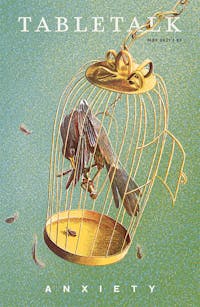
Request your free, three-month trial to Tabletalk magazine. You’ll receive the print issue monthly and gain immediate digital access to decades of archives. This trial is risk-free. No credit card required.
Try Tabletalk NowAlready receive Tabletalk magazine every month?
Verify your email address to gain unlimited access.
In the New Testament, the Greek word that is translated “anxiety” is an interesting word. It means for someone to be pulled apart, drawn in opposite directions, or divided into parts. When we are anxious about tomorrow, we are being distracted from what is directly in front of us, and our attention is divided from focusing on today. That is precisely why we experience tension when we are feeling anxious, for we feel torn apart and unable to give our complete attention to what God has set before us today. Charles Spurgeon said, “Anxiety does not empty tomorrow of its sorrows, but only empties today of its strength.”
Anxiety has a way of making us feel trapped when in fact we have been set free from worrying about tomorrow. Having been set free by the Spirit, we are enabled to obey Jesus’ command not to be anxious about tomorrow (Matt. 6:34). However, many Christians have been taught that Jesus was teaching us not to have any cares or concerns about the future or that taking wise precautions or preparing for the future means that we are somehow not trusting God. Yet Scripture is filled with wisdom for how we are to think about and plan for the future. And so, as we pray to our Father for our daily bread, just as Israel had to daily depend on manna from above, we trust God while we work diligently in our planning and preparation for the future.
Nevertheless, we still struggle with anxiety because we care about our own welfare and that of those whom we so dearly love. We become anxious about the future of our families, our health, our churches, our employments, our investments, and our nations because we care about them. We become anxious because we care, and we care because we love. However, our love and care will lead us into anxiety when we turn to ourselves and not to God.
God commands us to love Him above all other loves, and He calls us to cast all our anxieties upon Him because He cares for us. He doesn’t tell us to cast some of our anxieties upon Him, but all of them, even the ones we think we have under control—to cast them upon Him and leave them with Him. When we become anxious, it is often because we think we are in control. So, when we experience anxiety, let us remember that God cares more for us than we could ever care for ourselves. Let us run to Him in prayer, because going to our Father in prayer is the antidote to anxiety. When we pray, we are admitting that we are not God and that we are not in control but that He is and that He is working all things together for our good. For I have found that those who pray the most worry the least.
